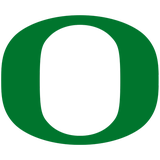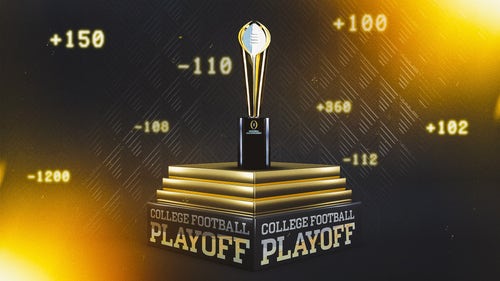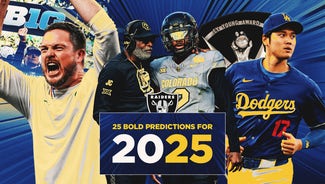
Jordan Bell leads Oregon to a victory over Kansas that was 78 years in the making
KANSAS CITY, Mo.— All along, they had been Ducks that refused to get wet. Flinging around bottles of water or firing off Super Soakers or dousing unsuspecting coaches, as had become the post-victory customs for teams nationwide, made no sense to Oregon. This was stuff you did when you accomplished something. And three wins in the NCAA tournament did not qualify as that. No one said as much out loud. No one really had to. Everyone knew Oregon would have reason to celebrate only when it washed away 78 years of history.
So, late Saturday night, after the Ducks made a big splash by ousting mighty Kansas, 74–60, a large blue jug stood upright and empty in the middle of the locker room floor. A lone paper cup rested nearby, tipped over on its side. Chunks of ice were scattered arouned the damp olive green carpet and crunched underfoot. Oregon was bound for its first Final Four since the very first Final Four, a trip more than eight decades in the making, so, yes, they’d at long last pour out all their emotions and all their liquids.
“Obviously we’re not done,” junior guard Casey Benson said. “The national championship is the ultimate goal. But you gotta enjoy things when they come.”

There was much to enjoy. Foremost was the stunning flushing of the No. 1 seed Jayhawks, in which Oregon rattled a prohibitive national title favorite into yet another Elite Eight implosion. It did so about 40 miles from their opposition’s home in Lawrence, which meant it cut down the nets as Midwest Region champions in a hilariously empty Sprint Center, rejoicing before a few hundred Ducks fans…and thousands of unoccupied seats abandoned by embittered Kansas faithful who weren’t going to stick around for the festivities. And, of course, this team provided the school its first Final Four berth since 1939. It drew the line between a small gym on Northwestern’s campus in Evanston, Ill., to the space station-dropped-in-the-desert that is University of Phoenix Stadium in Glendale, Ariz.
Really, the Ducks kept the vow they kept making to themselves. It was last spring when Oregon was the team that went completely unmoored in an Elite Eight loss to Oklahoma. Not long afterward, Jordan Bell sat in his coach Dana Altman’s office and reminded him of the pledge the hyper-athletic 6’ 9” forward and his classmates made as freshmen. They had assured their coach that they would bring Oregon to a Final Four during their careers. “Coach,” Bell said in the meeting with Altman, “I promise I’m going to get you there.”
Arguably no player was more responsible for what transpired Saturday.
Oregon won by striking fear in Kansas, pushing them around for the better part of the night. The 60% shooting and scintillating 1.419 points per possession in the first half were empirical examples of that. But Bell was the marauding embodiment of the effort. His 13 points were helpful but almost incidental. No, it was the 11 rebounds—seven on the offensive end—and his monstrous tally of eight blocked shots that utterly unnerved the Jayhawks. Everyone wondered what the Ducks would do once prolific shot-blocker Chris Boucher suffered an ACL tear during the Pac-12 tournament and was sidelined for the year. And everyone forgot that Jordan Bell was basically the reason Boucher was coming off the bench. “He made them think before they got in the lane,” Oregon forward Dillon Brooks said. “He’s been doing that all year. It’s nothing new to us.”

The 27 points that Tyler Dorsey contributed, including the three-pointer with 1:51 left to play that extended the Ducks’ lead to nine and killed Kansas’s late rally, cannot be overlooked. But consider: Dorsey’s big shot came only after he heaved a desperation attempt as the shot-clock wound down…and Bell corralled the wild rebound off the iron, which gave Dorsey a second chance at another round of March heroics.
In fact, when Altman reached the locker room—and after he received his soaking—he noted to his team that Bell was so dominant, it made it seem like Boucher was still on the floor. “That may have been his best performance in his three years,” Altman said. “He was phenomenal.”
While Oregon rose to the moment, Kansas wilted yet again. Arguably the most dominant and propulsive offensive team in the field of 68 thus far shot 35% on the night and averaged a measly .923 points per possession. (The Jayhawks had come in averaging 1.340 points per trip in their first three tournament games.) Freshman star Josh Jackson didn’t record a single point until the 11:20 mark of the second half. Junior guard Devonte’ Graham missed all seven of his shots from the field. When it found some success clamping down defensively, it missed 14 of 15 three-pointers after intermission to stifle any possibility of another offensive tsunami that could carry it into the Final Four.
The program had its own Elite Eight phantoms to overcome—the Jayhawks are now 2–5 in regional finals played under Bill Self—and the pressure was too much to bear. “I think we started the game really tight,” said senior guard Frank Mason III, who capped his career with a 21-point performance. Given a night to seize, with a throaty crowd behind them, the Jayhawks couldn’t assert themselves in any meaningful way. Oregon set the pace in what became 65-possesion game. Kansas, which had been averaging about 72 possessions in its previous three outings, couldn’t turbo-charge their way out of it.
“They all stick with me and they'll stick with the players that have been a part of it,” Self said of the defeat. “These guys put us in a situation to play for the highest stakes, and we just came up short. It's hard to admit—the best team did win today. I don't think we put our best foot forward like we have very consistently all season long.”
So, once the end came and the fast-emptying Sprint Center grew quieter and quieter, Oregon could be heard loud and clear. The players dumped a bucket of yellow and green confetti on Altman, and then Brooks leaned into the microphone just after his coach’s speech to the crowd: We’re going to the Final Four and we’re going all the way! the excitable Pac-12 Player of the Year hollered. Sixth-year senior Dylan Ennis talked about hushing the pro-Kansas crowd—We some dogs! he yelled—and then accommodated a television reporter’s request to, well, more or less just scream at the camera in delight.

This was reverie 78 years in the making, which meant it was just a cyclone of emotions that everyone would sort out later. “To beat Kansas by 14 points, I never dreamed it,” Phil Knight said, moments after the Nike founder and Oregon booster descended from the ladder after snipping off a piece of the net for himself. “I've been playing basketball for a long time," Ennis said. "This is even shocking to me."
There was more to do, so there was not much time to consider what already had been done. On March 27, 1939, Oregon defeated Ohio State in the title game of an eight-team championship tournament that was the NCAA’s first. The vast expanse of shortcomings and close calls that filled the space between then and Saturday had vanished, finally.
“We’re making history,” Dorsey said. “We’re not done, because we definitely want to put a banner up. There’s only one in the gym. It would look nice to put another one up.”






